In this blog, we’ll share about 10 things you need to know about the impact of AI on jobs. Artificial intelligence (AI) is transforming the world we live in, and the impact of AI on jobs is one of the most significant changes we will see in the coming years. As AI technologies continue to evolve, it is essential to understand how they will affect the workforce. Here are ten things you need to know about the impact of AI on jobs:
1.AI is changing the nature of work
AI technologies are increasingly able to perform tasks that were previously done by humans, leading to changes in the nature of work and the types of jobs that are available. Automation and machine learning are transforming the way businesses operate, from chatbots that provide customer support to autonomous vehicles that transport goods.
2. Some jobs will be eliminated
AI has the potential to automate many routine, repetitive, and low-skill jobs, leading to job displacement for some workers. For example, AI-powered chatbots are already replacing customer service representatives in some companies.
3. New jobs will be created
One of the positive impacts of AI on the workforce is the creation of new jobs. As AI technologies continue to evolve and become more prevalent, new job opportunities will emerge in areas such as data analysis, programming, and robotics.
For example, as businesses adopt AI-powered chatbots to handle customer service, new jobs will be created to develop, maintain, and improve these systems. Similarly, the development of autonomous vehicles will create new job opportunities in areas such as software development, systems engineering, and safety testing. While some jobs will be eliminated by AI, it is important to remember that new jobs will also be created, providing opportunities for workers who are prepared to adapt to the changing job market.
4. Job requirements will change
As AI becomes more prevalent in the workforce, job requirements will change, and workers will need to develop new skills and knowledge to keep up with the changing demands of their jobs. For example, data analysts will need to be proficient in using AI tools and algorithms to extract insights from large datasets. Similarly, customer service representatives will need to have a deep understanding of AI-powered chatbots and how to interact with them.
This means that workers will need to continuously upgrade their skills and knowledge through education and training programs to remain competitive in the job market. Employers will also need to provide opportunities for their employees to learn about and adapt to the changes brought about by AI technologies. Overall, the impact of AI on job requirements will require workers and employers to be flexible and adaptable to ensure that they remain relevant in the rapidly evolving job market.
5.AI will impact all industries
AI is poised to impact all industries, from healthcare and finance to transportation and manufacturing. By automating routine tasks, analyzing large datasets, and making predictions based on past data, AI has the potential to revolutionize the way businesses operate. For example, in healthcare, AI can be used to analyze medical records and identify patterns that can help doctors diagnose diseases more accurately and develop personalized treatment plans for patients. In finance, AI can be used to analyze market trends and make investment decisions based on past performance. In transportation, AI can be used to develop autonomous vehicles that can improve safety and reduce traffic congestion. These are just a few examples of how AI can transform various industries. As businesses continue to adopt AI technologies, the impact on all industries is likely to be profound and far-reaching.
6.AI will affect both blue-collar and white-collar jobs
While some believe that only low-skill jobs will be impacted, AI will also affect white-collar jobs such as accounting, legal services, and customer service. Even highly skilled professionals will need to adapt to the changes brought about by AI technologies.
7. The impact of AI on jobs will vary by country and region
The impact of AI on jobs will vary depending on factors such as a country’s level of economic development, education system, and labor laws. Some countries may experience more job displacement than others, depending on the degree to which they have embraced AI technologies.
8.AI will create a skills gap
As new jobs are created, there may be a gap between the skills that workers currently have and the skills that are needed for these new jobs. Governments and businesses will need to invest in education and training programs to ensure that workers are equipped with the skills they need to succeed in the jobs of the future.
9.AI will increase productivity
AI technologies have the potential to increase productivity and efficiency in the workplace, leading to economic growth and increased job opportunities in some areas. For example, autonomous vehicles can transport goods more quickly and efficiently than human drivers, leading to faster delivery times and lower costs for businesses.
10. Governments and businesses must prepare for the impact of AI on jobs
Governments and businesses must take proactive steps to mitigate the negative impact of AI on jobs, such as investing in education and training programs and providing support for workers who are displaced by AI technologies. The impact of AI on jobs will be significant, and it is up to us to prepare for and manage these changes in a way that benefits everyone.
In conclusion, AI will have a significant impact on the workforce in the coming years. While there will be challenges, there will also be opportunities for those who are prepared to adapt and embrace the changes brought about by AI technologies. By understanding the impact of AI on jobs and taking proactive steps to prepare for it, we can ensure a more prosperous future for all.
If you have any queries,please feel free to contact us.

Add a Comment